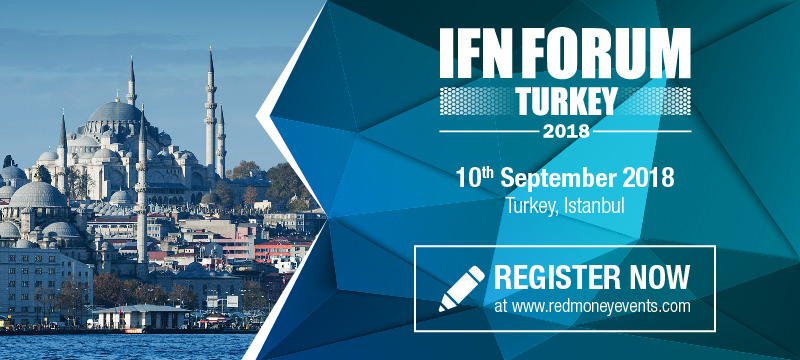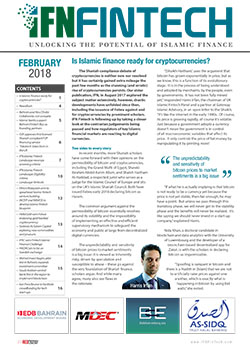GLOBAL: Does the current climate represent a manifestation of endemic problems within the global financial system – and could Islamic finance provide the answer? That is the question that this week's IFN Podcast attempts to answer, as Khalid Howladar of Acreditus speaks to IFN to explain his belief that the current debt cycle can only end badly for everyone…
The former global head of Islamic finance and head of GCC banks for Moody's Investors Service, Khalid has 20 years of industry experience under his belt, and he has never been shy about speaking his mind. A familiar figure within Islamic finance, since striking out on his own in 2017 Khalid has been quick to identify the urgent issues facing the industry – and explore how things could change.
The current situation with President Donald Trump in the US, and Brexit in the UK, are, he suggests, the inevitably populist consequences of the financial inequality and insecurity rife in the world today – and they highlight the need for a more inclusive financial system that favors the investment principles of Islamic finance. The rich are getting richer and the poor are getting poorer, and Khalid believes that we need to move away from the "obsession with debt finance" toward a more inclusive and ethical form of capitalism.
"If you look at the world today, we got out of the last debt crisis by taking on even more debt. Globally we are US$165 trillion in debt, which is 225% of total global GDP – how is this ever going to get paid back? Islamic finance actually discourages debt-based income," Khalid pointed out.
"In a society where rich people tend to have assets (land, equity, investments), they can leverage those assets to borrow cheaply. So the rich get richer. Lower income people tend to keep their money in cash in the bank, which the bank then uses to lend. So to simplify it, rich people are using the money that poor people keep in the banks to leverage their wealth at low rates and make even more. In comparison, Islamic finance favors equity-type ownership. So if you want to use my money, you have to invest it in something tangible and give me a share of what you get back. This economic angle is currently missing from a lot of our discussions around Islamic finance. We are not here just to replicate the conventional products – there is an element to Islamic finance that makes it genuinely better suited to our society. Our current system is simply not socially sustainable."
This all sounds very noble and very ambitious – but in reality, is it really the case? Some of the best-known Islamic instruments for example are Sukuk – essentially a Shariah compliant form of debt. And much of the Shariah compliant funding pool derives from institutional and high-net-worth investors – rich people, getting richer. Islamic finance might have the power to solve these problems – but is it actually doing so?
"This is the crux of the issue," said Khalid. "The poster child of Sukuk is perhaps not a good flag-bearer for the values of Islamic finance. Sukuk instruments at their core should be asset-backed, risk-sharing instruments. But crucially, the two most important people in the market are the issuer and the investor. They want the equivalent of a bond or a debt-type instrument. That's just the way things are. It can still act as a good foundation to raise awareness however – we can't expect to go straight from A to Z on day one. Perhaps, on the alphabet scale, we have only made it as far as D or E – we still have a long way to go."
But we are seeing a lot more soul-searching and a lot more interest in the social elements – and perhaps now Islamic financial institutions could feel more of an impetus to move toward a more genuine value proposition based on this ethical trend. "I think it is developing, and with more education and more transparency, those that genuinely care can start to move things slowly in that direction. The issue is that a lot of the industry has a vested interest in the current system. In all these discussions, you need to look at the various stakeholders around the table – there is a whole industry of people practicing in this market, and you need to look at their agenda and motivation."
Whether or not you agree, one point Khalid makes rings chillingly true. "Right now, interest rates (and profit rates) are super low. We've seen a lot of quantitative easing from governments. But there is a real risk that as rates start rising, a lot of people who have taken on debt in recent years may once again find themselves struggling – and that is not good for anyone. We need to be mindful that this perpetual debt cycle that we are in could eventually end pretty badly in the future."
To hear the full conversation and learn more about Khalid's views on the future of Islamic finance, log on to www.islamicfinancenews.com/podcasts. |
Summer slowdown?
As we are now in the holy month of Ramadan and with the thermometer and thoughts of summer starting to rise in the Middle East, we would normally expect investor interest in Islamic real estate investments to have started waning by now, which is certainly what I have seen in previous years. However, we seem to be getting more enquiries than ever, with no let-up in sight. |
















No comments:
Post a Comment
Note: Only a member of this blog may post a comment.